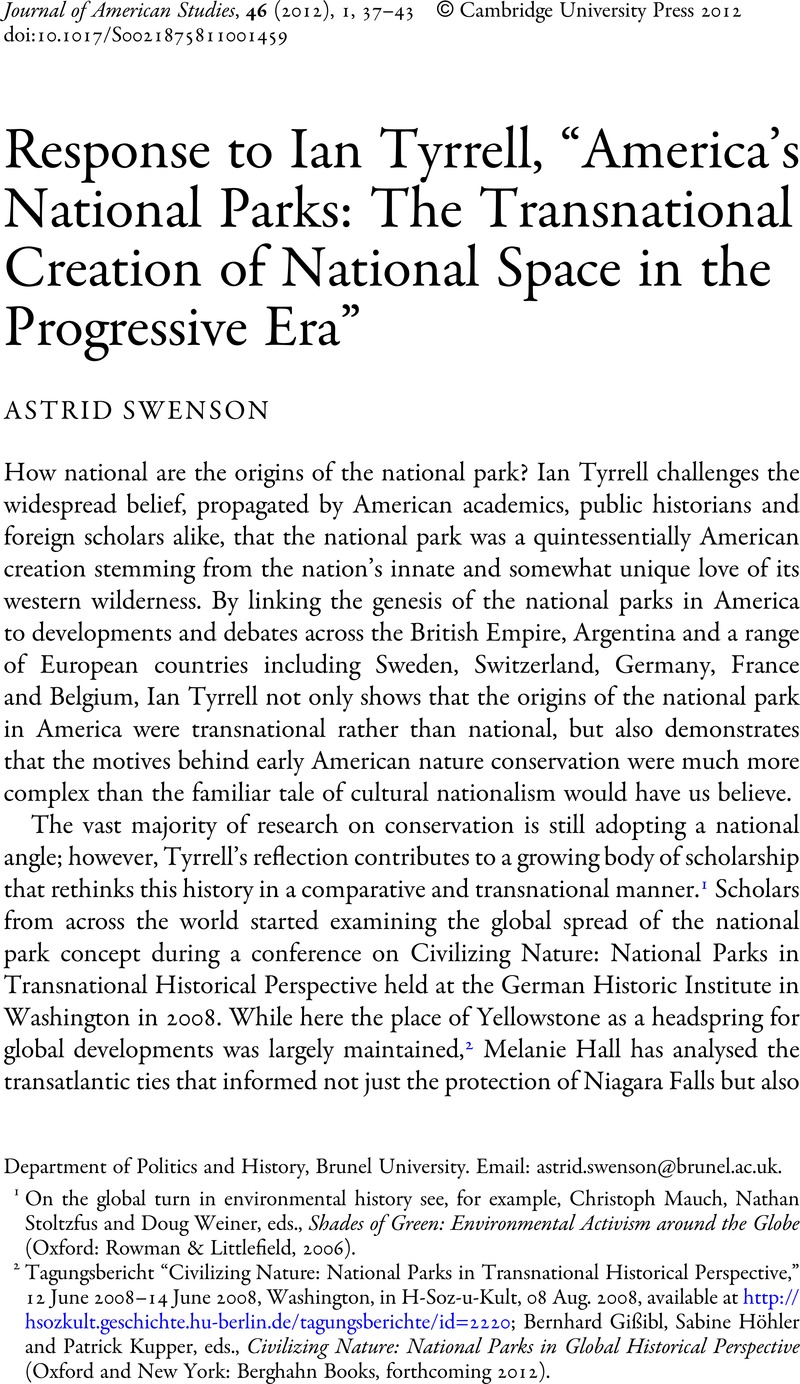No CrossRef data available.
Published online by Cambridge University Press: 09 March 2012

1 On the global turn in environmental history see, for example, Mauch, Christoph, Stoltzfus, Nathan and Weiner, Doug, eds., Shades of Green: Environmental Activism around the Globe (Oxford: Rowman & Littlefield, 2006)Google Scholar.
2 Tagungsbericht “Civilizing Nature: National Parks in Transnational Historical Perspective,” 12 June 2008–14 June 2008, Washington, in H-Soz-u-Kult, 08 Aug. 2008, available at http://hsozkult.geschichte.hu-berlin.de/tagungsberichte/id=2220; Gißibl, Bernhard, Höhler, Sabine and Kupper, Patrick, eds., Civilizing Nature: National Parks in Global Historical Perspective (Oxford and New York: Berghahn Books, forthcoming 2012)Google Scholar.
3 Melanie Hall, “Niagara Falls: Preservation and the Spectacle of Anglo-American Accord”, in idem, ed., Towards World Heritage: International Origins of the Preservation Movement, 1870–1930 (Aldershot: Ashgate, 2011), 23–43; idem, “Despoliation or Diplomacy? Britain, Canada, the United States and the Evolution of an English-Speaking Heritage,” in Astrid Swenson and Peter Mandler, eds., From Plunder to Preservation: Britain and the Heritage of Empire, 1800–1950 (Proceedings of the British Academy, Oxford University Press, forthcoming).
4 Kupper, Patrick, Wildnis schaffen: Eine transnationale Geschichte des Schweizerischen Nationalparks (Bern: Haupt, 2012)Google Scholar.
5 Danny Trom, “Natur und nationale Identität. Der Streit um den Schutz der “Natur” um die Jahrhundertwende in Deutschland und Frankreich,” in Etienne François, Hannes Siegrist and Jakob Vogel, eds., Nation und Emotion. Deutschland und Frankreich im Vergleich, 19. und 20. Jahrhundert (Göttingen: Vandenhoeck & Ruprecht, 1995), 147–67; Swenson, Astrid, The Rise of Heritage: Preserving the Past in France, Germany and England, 1789–1914 (Cambridge: Cambridge University Press, forthcoming)CrossRefGoogle Scholar.
6 Swenson, The Rise of Heritage; and Wöbse, Anna-Katharina, Weltnaturschutz: Umweltdiplomatie in Völkerbund und Vereinten Nationen 1920–1950 (Frankfurt am Main: Campus Verlag 2012)Google Scholar.
7 See Sadiah Qureshi, “Dying Americans: Race, Extinction and Conservation in the New World,” in Swenson and Mandler.
8 See, for instance, the reports from the Second International Heimatschutz Congress, Heimatschutz, 8 (1912), 58–59. On membership see Rollins, William H., A Greener Vision of Home: Cultural Politics and Environmental Reform in the German Heimatschutz Movement, 1904–1918 (Ann Arbor: The University of Michigan Press, 1997), p. 104–5CrossRefGoogle Scholar.
9 For instance, during a conference on From Plunder to Preservation: Britain and the Heritage of Empire, King's College, Cambridge, UK, March 2009, Maya Jasanoff (Harvard University) raised the issue of how far we should see the human plunder of empire, in the form of slaves, as analogous to the plunder in the form of artworks. See Astrid Swenson, “The Heritage of Empire,” in Swenson and Mandler.
10 Reports from her Majesty's Representatives Abroad as to the Statutory Provision Existing in Foreign Countries for the Preservation of Historical Buildings. Presented to the House of Commons by Command of Her Majesty in pursuance of their Address, 30 July 1897, Parliamentary Papers, (1897), LXXII, p. 367; Brown, Gerald Baldwin, The Care of Ancient Monuments. An Account of the Legislative and Other Measures Adopted in European Countries for Protecting Ancient Monuments and Objects and Scenes of Natural Beauty and for Preserving the Aspect of Historical Cities (Cambridge: Cambridge University Press, 1905), pp. 243–48Google Scholar.
11 See Lingelbach, Gabriele, Klio macht Karriere. Die Institutionalisierung der Geschichtswissenschaft in Frankreich und den USA in der zweiten Hälfte des 19. Jahrhunderts (Göttingen: Vandenhoeck & Ruprecht, 2003)Google Scholar.
12 See Astrid Swenson, “The Law's Delay? Preservation Legislation in France, Germany and England, 1870–1914,” in M. Hall, ed., Towards World Heritage: International Origins of the Preservation Movement, 1870–1930 (Aldershot: Ashgate, 2011), 139–54.
13 E.g. Brown, 243.